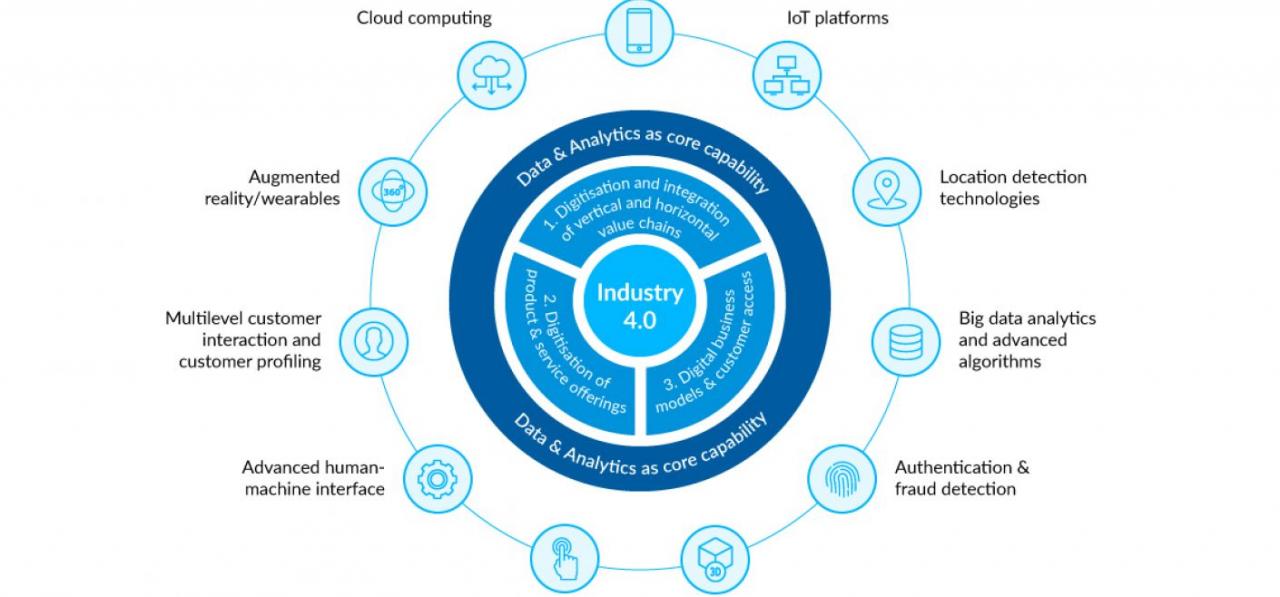Safiyanov D.R.
Digital transformation of business models of domestic organizations
This paper presents the trend of digital transformation of business models in modern organizations in Russia, which occurred under the influence of the developed socio-economic and political strategy of the state, which in turn was formed under the influence of global technological progress in recent years. The development of the digital economy is becoming especially important as digital transformation has become a global trend, changing the usual economic ties and existing business models. Russia is not yet among the leaders in this process, but sets ambitious goals, they are aimed at increasing business efficiency through the introduction of Russian digital solutions and stimulating import substitution. Today, government bodies are leaders in the pace of digitalization and provide a powerful impetus for business development. The study of this process is especially relevant now, as we see that international corporations are introducing new technologies and digital transformation of their business models in order to maintain a leading position in their industry niche.
Key words: digital transformation, business model, organization, organizational management, strategy.
In a market economy, in order to increase the competitiveness of enterprises, reduce costs and increase profits, it is necessary to use innovative activities, which in turn will create conditions for its effective development. Decree of April 18, 2016 No. 317 "On the implementation of the National Technology Initiative" approved the mechanism for the implementation of the National Technology Initiative (NTI), which is a long-term interdepartmental program of public-private partnership to promote the development of new promising markets based on high-tech solutions that will determine the development world and Russian economies in 15-20 years [5]. According to a study by The Boston Consulting Group, executives across a wide range of industries prioritize the adoption of Industry 4.0 technologies as a top priority for business development.
Accordingly, the main emphasis is on achieving higher production productivity at the expense of improving other indicators of economic efficiency. This situation is explained by the lack of a holistic approach to digital business transformation at enterprises, an insufficient level of digitalization of management itself, and a low degree of integration of management decisions on the development of digitalization processes in various structural divisions of the enterprise. This means that not only production business processes, but also management processes should be transferred to a new stage of development. This will enable manufacturing enterprises to fully exploit the high potential of the new digital technologies in Industry 4.0. So, according to experts in the digital economy, it is only through the introduction of artificial intelligence technologies in the process of making managerial decisions that it is possible to increase the efficiency of doing business by 30%. Today, the impact of digital technologies on the rate of urbanization in most countries of the world outstrips the rate of growth of their economies. Against the backdrop of economic challenges and megatrends, countries are faced with the need to look for new ways of development in order to create highly productive jobs, increase the number of innovative enterprises and improve the living standards of the population. To do this, it is necessary to choose the right innovation strategy in combination with infrastructural and technological tools.
Digital transformation is one of the national development goals of the Russian Federation for the period up to 2030, stipulated by the Decree of the President of the Russian Federation Vladimir Putin No. 474 "On the national development goals of the Russian Federation for the period up to 2030" dated July 21, 2020 [4].
The tasks for digital transformation in Russia for the next decade were outlined by the head of state in December 2020. Within the framework of the national goal "Digital transformation", it is envisaged, in particular, to achieve "digital maturity" of key sectors of the economy and social sphere, including healthcare and education, as well as public administration, an increase in the share of mass socially significant services available in electronic form, etc. .d. Over the past year, our country has made significant progress in the field of digital transformation, significant changes have taken place in this area: all federal executive bodies have appointed Chief Digital Transformation Officer, similar appointments are taking place in the regions [2]. A series of projects on the use of artificial intelligence in the activities of a number of federal executive bodies has started. They have been tasked to improve the quality and efficiency of the provision of public services, to reduce the costs of public administration. Its implementation is associated, first of all, with the transfer of public services "into digital", this also applies to the implementation of control and supervision activities and government functions. The digital transformation of state power has matured and is ready to make a qualitative leap, this is noticeable in many ways: in the abundance of projects, in the appearance of a large number of people who work in this and achieve results. The instrument for the digital transformation of public administration is the NAMI - a set of solutions that represent a single legal, methodological, managerial and technological mechanism for working with government data. “LAMS helps to solve the problems faced by the authorities. This is all that is connected with management processes, with obtaining data, accessing this data, and storing it. Data management is the main mechanism for ensuring efficiency.
State-owned companies are not far behind government agencies: in 2020, the number of state-owned companies that have developed and are implementing a digital strategy has doubled (from 25% to 48%); digitalization of business processes, data-driven management, customer experience management, product value management are among the priorities of companies. and services. The average level of digitalization of processes in all industries is 54%. The RF Ministry of Digital Development has developed and published guidelines for the digital transformation of state-owned companies, including a typical strategy structure and a system of key performance indicators. The leaders of digital transformation (in addition to the IT sector) are banks and financial organizations, housing and communal services, telecom, insurance and the oil and gas industry. The number of pilot projects in the largest companies in 2020 increased by 38% compared to 2019, up to 85% of the largest companies used artificial intelligence solutions. Real projects on unmanned vehicles (KAMAZ trucks, harvesters) have been launched. The use of voice assistants and smart chatbots is exploding. A transition is underway from simple AI models to more complex, complex solutions and networks of intelligent objects. Hyper-converged infrastructures are being actively implemented, and the first projects for the implementation of Cloud-Native infrastructures are being implemented. In 2021-2025, experts predict a significant increase in the level of digitalization of government agencies, the active transfer of all government services to electronic form, and an increase in demand for CDTO. “Digital transformation is leading to the fourth industrial revolutions in agriculture, industry, transport and logistics, the consumer sector and other industries. Intelligent greenhouses, the use of AI for plant breeding, robotization, precision farming and animal husbandry, vertical greenhouses - all this is the fourth agrarian. According to forecasts, the number of Call Centers that do not use smart chatbots and voice robots will sharply decrease. More and more IT companies will begin to successfully play in “foreign” markets, previously occupied by large industrial or service companies. Small companies will be included in the digital transformation. The IP architecture will be dominated by a platform approach.
These changes will also cause some negative trends, experts say. So, for example, there will be a growing gap between the leaders of digital transformation and companies lagging behind them in terms of digitalization, efficiency or profitability. In addition, the accelerated adoption of digital technologies will lead to the rapid obsolescence of various specialties and the release of labor. This means that the state will have to quickly adapt to the changing situation and regulate emerging social issues. The penetration of the Internet and social networks will increasingly raise questions of privacy, protecting the interests of citizens. State control over the Internet and society will increase significantly. Digital transformation will change the way people live. It is predicted that working from home will lead to an outflow of residents from cities and increase migration flows both within the country and between countries. To meet the ever-increasing demands, workers will need ongoing education or training. Accordingly, there will be an increase in the field of education, mainly remote. The basis for the digital transformation of all spheres of social and economic development of the Russian Federation is a developed telecommunications infrastructure. The activities of the national program "Digital Economy of the Russian Federation" are implemented on the territory of the constituent entities of the Russian Federation within the framework of the relevant agreements concluded between the heads of federal projects and the heads of regional projects.
In 2020, 424 agreements were concluded on the implementation of regional projects (85 agreements for each of the federal projects: Information infrastructure, Information security, Human resources for the digital economy (except for Moscow), Digital technologies, Digital public administration). The Ministry of Digital Development, Communications and Mass Media of the Russian Federation (hereinafter referred to as the Ministry of Digital Development of the Russian Federation) coordinates the leaders of the digital transformation of the constituent entities of the Russian Federation and the leaders of the digital transformation of regional executive authorities in the framework of achieving the national goal "Digital Transformation", determined by the Decree of the President of the Russian Federation of July 21, 2020 No. 474 "On the national development goals of the Russian Federation for the period up to 2030" [6]. Within the framework of the national goal "Digital transformation", it is envisaged, in particular, to achieve "digital maturity" of key sectors of the economy and social sphere, including healthcare and education, as well as public administration, an increase in the share of mass socially significant services available in electronic form, etc. .d. On April 19, 2021, the Ministry of Digital Development, Communications and Mass Media of the Russian Federation announced the approval by the Government of the Russian Federation of directives on the digital transformation of state-owned companies. They are aimed at increasing business efficiency by introducing Russian digital solutions and stimulating import substitution, the department noted. Representatives of the Russian Federation on the boards of directors must, within 10 days, initiate meetings of the councils to discuss the development or updating of digital transformation strategies until 2024. It is planned that by 2024 all companies with a 50% share of the state will join the implementation of the directives. Digital transformation strategies for state-owned companies must be developed or brought up to date by September 1, 2021 [1]. After that, they will need to be coordinated with the relevant ministries and the Ministry of Digital Science of the Russian Federation. Methodological recommendations will help to assess the level of digitalization, set a target vision and key performance indicators, provide for human resources, create a digital transformation management system and a model for financing strategies, as well as form roadmaps. Prior to that, they were tested by leading Russian companies, including Russian Railways, Russian Post, Aeroflot and others. Among state-owned companies, there are both absolute leaders in digital transformation and those who have not yet singled out this area as a priority. The task of the directives is to scale and structure digitalization and import substitution activities, not only controlling companies, but also helping them with methodological recommendations, expertise and financial instruments [6]. Methodological recommendations for the digital transformation of state corporations and companies with state participation have been developed with the aim of providing methodological support for the development and updating of digital transformation strategies (programs) (hereinafter referred to as the Strategy), including proposals on the structure, content and list of key performance indicators for monitoring the implementation of the Strategies (hereinafter - KPIs) of state corporations, companies with state participation and other organizations determined by directives to representatives of the interests of the Russian Federation for participation in meetings of the boards of directors (supervisory boards) of organizations as part of the execution of individual orders of the Government of the Russian Federation (hereinafter referred to as the Directives, state company), as well as the procedure monitoring the implementation of the Strategy.
Methodological recommendations were developed as part of the implementation of the activities of the federal project "Digital Technologies", approved by the minutes of the meeting of the Presidium of the Government Commission on Digital Development, the Use of Information Technologies to Improve the Quality of Life and Conditions for Doing Business (hereinafter - the Presidium of the Government Commission) dated May 28, 2019 No. 9 (hereinafter - the federal project "Digital Technologies"), as part of the implementation of the national program "Digital Economy of the Russian Federation", approved by the minutes of the meeting of the Presidium of the Council under the President of the Russian Federation for Strategic Development and National Projects No. 7 dated June 4, 2019 (hereinafter - the national program "Digital Economy"). According to the guidelines for the digital transformation of state-owned companies, the strategy of digital transformation of a state-owned company should be aimed at achieving the strategic goals enshrined in the development strategy of a state-owned company, and take into account the provisions of other long-term planning documents adopted by the state company (in particular, a long-term development program, an innovative development program). If a state-owned company has a long-term development program, it is recommended to supplement it with the provisions of the Strategy in terms of the goals and objectives of digital transformation of state-owned companies, as well as include KPIs related to digital transformation, such as "Volume of investments in digital transformation", "Share of expenses for the purchase of Russian software" , "Increasing investments in domestic solutions in the field of information technology" and others, including KPIs characterizing the achievement within the framework of the national goal "Digital transformation" of "digital maturity" of key sectors of the economy and social sphere, including healthcare and education, as well as public administration in accordance with the Decree of the President of the Russian Federation of July 21, 2020 No. 474 "On the national development goals of the Russian Federation for the period up to 2030" [4]. At the same time, as world experience shows, the basis of the digital economy of advanced countries is innovative products, primarily in the IT sector. In this regard, the main task today is to find the most effective mechanisms for managing the innovative development of enterprises. Foreign experience shows that the development of venture capital financing favorably affects their innovative activity of enterprises, which ultimately affects the country's economy as a whole and its digitalization [3]. Corporate venture capital investments, primarily in the IT sector, should become the driver of Russia's digital economy. According to the Digital Economy program, by 2024 at least ten high-tech and globally competitive high-tech enterprises should appear in Russia.
Bibliographic list
1.Azarov Yu.Yu. Transformation of state data management in Russia // Report of the Department of methodological support for working with data. 12/15/2020 C. 5. - // [Electronic resource]. - Access mode: https://ac.gov.ru/news/page/cifrovaa-transformacia-v-rossii-itogi-2020-goda-i-perspektivy-razvitia-26801/ (date of access: 05/05/2021).
2. Alexandrova, TV Digitalization as a modern trend in the development of management of industrial organizations / TV Alexandrova. - Text: electronic // [Electronic resource]. - Access mode: https://cyberleninka.ru/article/n/tsifrovizatsiya-kak-sovremennyy-trend-razvitiya-menedzhmenta-proizvodstvenny horganizatsiy ??? history = 20 & pfid = 1 & sample = 26 & ref = 0 (date of access: 07.10. 2020).
3. Lysenkov, M. S. Influence of digital technologies on the development of enterprises / M. S. Lysenkov. - Text: direct // Young scientist. - 2020. - No. 41 (331). - S. 243-244. - //[Electronic resource]. - Access mode: https://moluch.ru/archive/331/74027/ (date of access: 05/06/2021).
Regulations
4. Decree of the President of the Russian Federation of July 21, 2020 No. 474 “On the national development goals of the Russian Federation for the period up to 2030” // [Electronic resource]. - Access mode: https://www.garant.ru/products/ipo/prime/doc/74304210/ (date of access: 05/02/2021).
5. Resolution of the Government of the Russian Federation of April 18, 2016 N 317 "On the implementation of the National Technology Initiative" (with amendments and additions) // [Electronic resource]. - Access mode: http://www.consultant.ru/document/cons_doc_LAW_196930/ (access date: 05/07/2021).
6. Guidelines for digital transformation of state corporations and companies with state participation from November 17, 2020 // [Electronic resource]. - Access mode: https://digital.gov.ru/ru/documents/7342// (date of access: 05/03/2021).









Комментарии 0